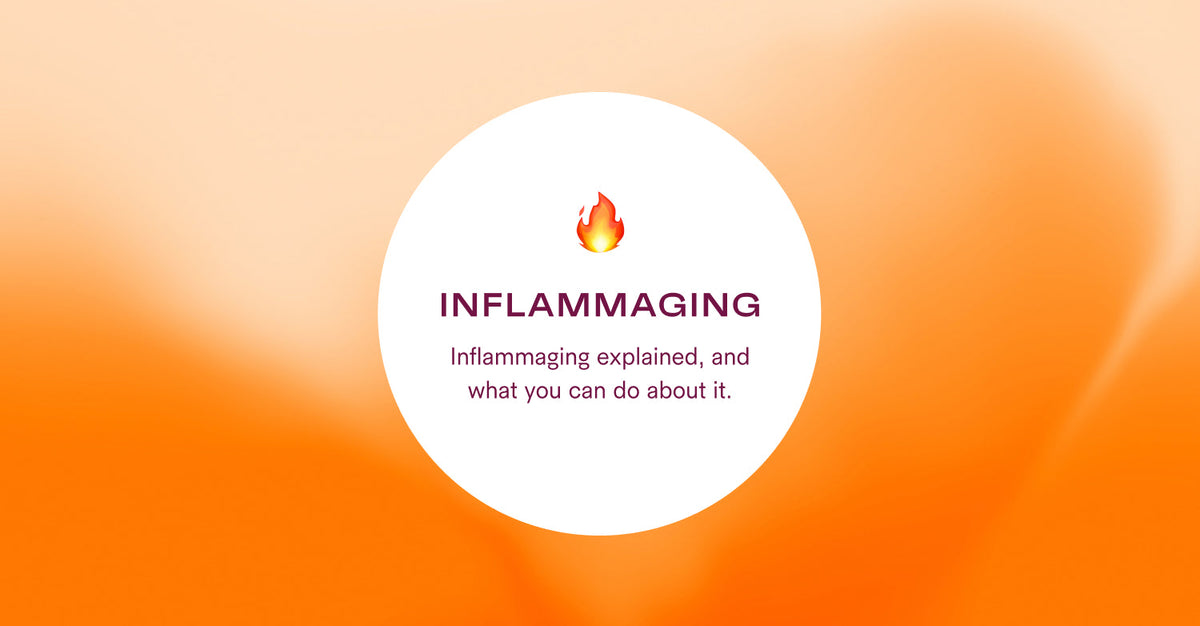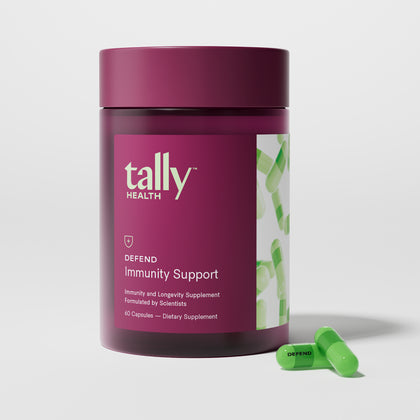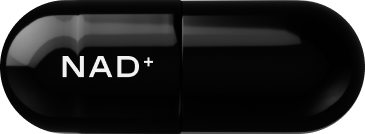

Inflammaging—it’s the scientific term everyone’s talking about. Even Oprah recently made it her “word of the week.” But what exactly is it, and why does it matter? As we age, we don’t just collect memories and wisdom; we also accumulate chronic, low-grade inflammation that silently drives the aging process. Let’s explore how this critical hallmark of aging shapes our immune system function and what you can do to reduce its impact.
Defend is your personal bodyguard against bugs and sick days. This uniquely formulated blend of quercetin, beta-glucan, zinc, vitamin D3, and vitamin C is designed to support a healthy immune response and help combat inflammaging at the cellular level.
What is Inflammaging?

When you cut your finger or catch a cold, your immune responses kick into gear, dispatching white blood cells and inflammatory mediators to fight infection. This acute inflammation is beneficial—it’s your body’s first line of defense. However, when inflammation becomes chronic and persistent, it triggers harmful inflammatory processes that damage cellular components and accelerate biological aging.
Inflammaging refers to the chronic, low-grade inflammation that develops with human aging. It’s marked by elevated inflammatory markers such as C-reactive protein (CRP), interleukins (e.g., IL-1β, IL-6), and tumor necrosis factor-alpha (TNF-α). These pro-inflammatory cytokines contribute to systemic inflammation and increase the risk of age-related chronic diseases like cardiovascular disease, chronic kidney disease, Alzheimer’s disease, rheumatoid arthritis, and metabolic dysfunction.
Over time, persistent DNA damage, oxidative stress, and reactive oxygen species (ROS) impair cellular homeostasis, leading to metabolic inflammation, immune dysfunction, and cell cycle arrest. Together, these inflammatory stimuli accelerate cellular senescence—a state where senescent cells stop dividing but secrete inflammatory factors, known as the senescence-associated secretory phenotype (SASP), that spread inflammation throughout tissues.
What Causes Inflammaging?

From an evolutionary perspective, inflammaging is the price we pay for surviving infections early in life. Over time, the immune system shifts from effective defense to chronic activation. Inflammaging has been described as a “sterile” inflammation—meaning it persists even without infection.
As we age, immune cells such as macrophages, T cells, and B cells exhibit dysregulated signaling pathways and reduced ability to clear damaged or stressed cells. The decline in autophagy leaves behind debris that triggers further inflammatory signaling. Meanwhile, senescent cells and endothelial cells in the vascular system release growth factors and inflammatory mediators that impair vascular smooth muscle cells, promoting cardiovascular disease and insulin resistance.
The gut microbiota also plays a key role. Age-related changes in the gut microbiome disrupt metabolic homeostasis and increase inflammatory cytokine production. Environmental factors—like poor diet, oxidative stress, sleep deprivation, and sedentary lifestyles—add to the inflammatory burden and speed up aging cell dysfunction.
Inflammaging and Cellular Senescence

Cellular senescence, one of the main aging hallmarks, directly contributes to chronic inflammation. Senescent cells adopt an inflammatory phenotype through the SASP, secreting pro-inflammatory cytokines, chemokines, and growth factors. This reinforces systemic inflammation and disrupts energy metabolism and cell compartment stability.
Aging research shows that chronic inflammatory diseases accelerate telomere shortening, leading to cell death and cognitive decline. Conversely, centenarians often exhibit a healthier balance of anti-inflammatory factors—notably higher regulatory T cells (Treg) compared to Th17 cells—supporting better immune function and healthy ageing.
How to Reduce Inflammaging: Science-Backed Strategies

Want to slow the aging process and reduce excessive inflammation? Here are science-supported tips to promote healthy aging and support immune system function:
1. Adopt an Anti-Inflammatory Diet
A Mediterranean diet rich in antioxidants, omega-3s, and polyphenols is a proven natural anti-inflammatory agent. Studies show it lowers inflammatory markers and improves metabolic inflammation and energy metabolism. Calorie restriction and plant-based foods rich in fiber and vitamin D further support anti-inflammatory signaling pathways.
2. Optimize Zinc Intake
Zinc is vital for immune function and protecting circulating cells from oxidative stress. It supports innate immune responses and reduces inflammatory markers. Older adults often face a zinc deficiency, which can worsen age-associated diseases. Supplements like Defend or zinc-rich foods (pumpkin seeds, lentils, cashews, eggs) help mitigate inflammaging.
3. Prioritize Exercise
Lifelong aerobic exercise and high-intensity interval training lower inflammatory cytokines like IL-6 and improve immune system resilience. Exercise enhances energy metabolism and reduces exercise-induced inflammation, supporting better vascular health and reduced systemic inflammation.
4. Maintain Oral and Gut Health
Oral bacteria and gut dysbiosis can drive inflammatory diseases and metabolic inflammation. Maintaining oral hygiene and a balanced gut microbiota protects against inflammatory phenotypes and age-associated diseases.
5. Improve Sleep Quality
Inadequate or excessive sleep disrupts immune regulation and raises inflammatory markers. Aim for at least 7 hours per night to maintain metabolic homeostasis and reduce systemic inflammation.
6. Limit Alcohol and Avoid Late-Night Eating
Both alcohol and late-night eating impair circadian rhythm and promote reactive oxygen species (ROS) formation, increasing inflammatory stress.
7. Embrace Sauna Therapy
Regular sauna use promotes vascular health and reduces inflammatory mediators. Studies link frequent sauna bathing with lower CRP and IL-6 levels, improving immune function and reducing inflammaging-related clinical manifestations.
The Bottom Line

From cellular senescence to immune system dysregulation, inflammaging lies at the center of human aging. Yet through anti-inflammatory diets, exercise, and targeted supplements like Defend, you can modulate inflammatory pathways, protect cellular components, and support healthy ageing at every level.
References
Franceschi and Campisi. Chronic inflammation (inflammaging) and its potential contribution to age-associated diseases. J Gerontol A Biol Sci Med Sci 2014; https://doi.org/10.1093/gerona/glu057
López-Otín et al. Hallmarks of aging: An expanding universe. Cell 2032; https://doi.org/10.1016/j.cell.2022.11.001
Dugan et al. Inflammaging as a target for healthy ageing. Age Ageing 2023; https://doi.org/10.1093/ageing/afac328
Santoro et al. Immunosenescence and inflammaging in the aging process: age-related diseases or longevity? Ageing Res Rev 2021; https://doi.org/10.1016/j.arr.2021.101422
Baechle et al. Chronic inflammation and the hallmarks of aging. Mol Metab 2023; https://doi.org/10.1016/j.molmet.2023.101755
Furman et al. Chronic inflammation in the etiology of disease across the life span. Nat Med 2019; https://doi.org/10.1038/s41591-019-0675-0
What is inflammaging?
Inflammaging refers to the chronic, low-grade inflammation that develops with human aging. It’s marked by elevated inflammatory markers such as C-reactive protein (CRP), interleukins (e.g., IL-1β, IL-6), and tumor necrosis factor-alpha (TNF-α). These pro-inflammatory cytokines contribute to systemic inflammation and increase the risk of age-related chronic diseases like cardiovascular disease, chronic kidney disease, Alzheimer’s disease, rheumatoid arthritis, and metabolic dysfunction.
What causes inflammaging?
As we age, immune cells such as macrophages, T cells, and B cells exhibit dysregulated signaling pathways and reduced ability to clear damaged or stressed cells. The decline in autophagy leaves behind debris that triggers further inflammatory signaling. Meanwhile, senescent cells and endothelial cells in the vascular system release growth factors and inflammatory mediators that impair vascular smooth muscle cells, promoting cardiovascular disease and insulin resistance.
How can you reduce inflammaging?
To slow the aging process and reduce excessive inflammation, adopt an anti-inflammatory diet, optimize zinc intake, prioritize exercise, maintain oral and gut health, improve sleep quality, limit alcohol and late-night eating, and embrace sauna therapy. These strategies help lower inflammatory cytokines, protect against oxidative stress, and support immune system function.











